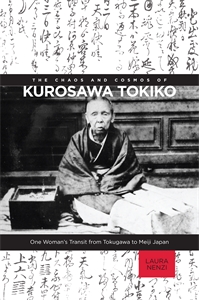The Chaos and Cosmos of Kurosawa Tokiko: One Woman’s Transit from Tokugawa to Meiji Japan
- About the Book
-
The Chaos and Cosmos of Kurosawa Tokiko is the story of a self-described “base-born nobody” who tried to change the course of Japanese history. Kurosawa Tokiko (1806–1890), a commoner from rural Mito domain, was a poet, teacher, oracle, and political activist. In 1859 she embraced the xenophobic loyalist faction (known for the motto “revere the emperor, expel the barbarians”) and traveled to Kyoto to denounce the shogun's policies before the emperor. She was arrested, taken to Edo's infamous Tenmachō prison, and sentenced to banishment. In her later years, having crossed the Tokugawa-Meiji divide, Tokiko became an elementary school teacher and experienced firsthand the modernizing policies of the new government. After her death she was honored with court rank for her devotion to the loyalist cause.
Tokiko's story reflects not only some of the key moments in Japan's transition to the modern era, but also some of its lesser-known aspects, thereby providing us with a fresh narrative of the late-Tokugawa crisis, the collapse of the shogunate, and the rise of the Meiji state. The peculiar combination of no-nonsense single-mindedness and visionary flights of imagination evinced in her numerous diaries and poetry collections nuances our understanding of activism and political consciousness among rural nonelites by blurring the lines between the rational and the irrational, focus and folly. Tokiko's use of prognostication and her appeals to cosmic forces point to the creative paths some women constructed to take part in political debates and epitomize the resourcefulness required to preserve one's identity in the face of changing times. In the early twentieth century, Tokiko was reimagined in the popular press and her story was rewritten to offset fears about female autonomy and to boost local and national agendas. These distorted and romanticized renditions offer compelling examples of the politicization of the past and of the extent to which present anxieties shape historical memory.
That Tokiko was unimportant and her loyalist mission a failure is irrelevant. What is significant is that through her life story we are able to discern the ordinary individual in the midst of history. By putting an extra in the spotlight, The Chaos and Cosmos of Kurosawa Tokiko offers a new script for the drama that unfolded on the stage of late-Tokugawa and early Meiji history.
- About the Author(s)
-
Laura Nenzi, Author
- Reviews and Endorsements
-
- Nenzi has taken great pains to justify this account of Tokiko’s life. . . . The Chaos and Cosmos of Kurosawa Tokiko would be a great text for an undergraduate Japanese history course, providing students with a case study of how different historiographical themes converge in the life of one individual.
—Monumenta Nipponica - Laura Nenzi is a meticulous historian. She has painstakingly explored the rich archive that Tokiko left after her death in 1890 . . . microhistorical research by scholars such as Nenzi—our “chronicler who narrates events without distinguishing between major and minor ones” and who so sensibly and accurately recreates life at the margins of “big history”—has in itself the potential to bring back to life the past and all the promises that are not yet realized. I strongly recommend this book at the margins of big history.
—Journal of Japanese Studies - This is a fascinating and illuminating account of the travails of a poet, prognosticator, and educator from rural Japan who was compelled by cosmic signs and rational analysis of contemporary events towards extraordinary political activism at a crucial moment towards the end of the Tokugawa (1600–1868) era. . . . . a careful reading will reward anyone interested in fringe political activism and identity construction (gender, local, national) at a critical juncture in the modern history of an important nation-state.
—Pacific Affairs
- Nenzi has taken great pains to justify this account of Tokiko’s life. . . . The Chaos and Cosmos of Kurosawa Tokiko would be a great text for an undergraduate Japanese history course, providing students with a case study of how different historiographical themes converge in the life of one individual.
- Supporting Resources
-










